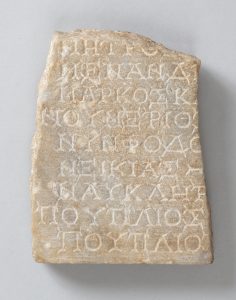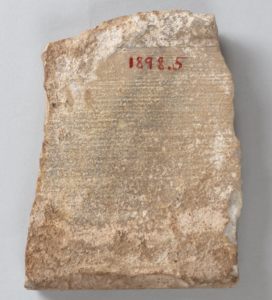

Above is an image of a Greek funerary inscription from the 2nd century CE. Made of marble and measuring about the size of a large book (5 9/16 in. x 4 5/16 in. x 13/16 in.), its broken off back side suggest that it was once part of a larger funerary object, potentially a statue or a group of stelai.
Greece has a rich history in stele that dates back to at least the 8th century BC, nearly 1000 years before the dating of this stele. In her book Funerary Epigrams of Ancient Greece, Marta Gonzalez Gonzalez notes that Greek literature was still “essentially an oral tradition” in Greece’s Archaic period around the 2nd century BC. Yet, even before that time, Gonzalez says stelai like this one were “meant to be read.” While in some Greek inscriptions, the audience of the inscription’s speaker is the dead itself, rendering a more inward message, others read like Roman inscriptions on roads near Rome, in which the speaker in the inscription speaks in the imperative to “an anonymous passerby.” These roadside stelai existed in Greece as well, especially during a period from 490–440 BCE, when Greece formally instituted public speeches in Athens for the war dead as well as the construction of stone monuments dedicated to them, which were placed along a road to the Academy in an area known as demosion sema, which Gonzales describes as a “place in which speeches and public celebrations served to interpret the past, express shared values and build a collective identity for the city.” With speeches and stelai, Greece combined its famed tradition of oral commemoration with physical inscriptions to reach a wide ranging audience. We can see through this state sanctioned commemoration that Greece wanted its people to engage actively with commemoration to the dead, especially the war dead.
While it is unclear who is the specific audience of this stelai, we can infer from Greece’s history of active engagement in commemoration that audience was likely a key factor in inscriptions, and the writing was likely very intentional.
